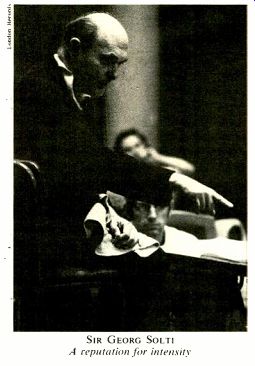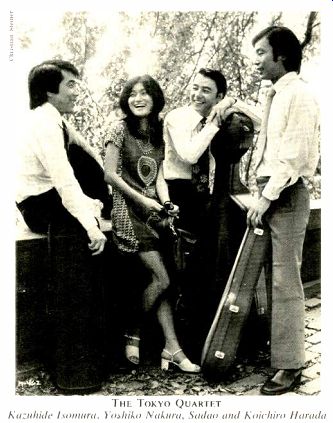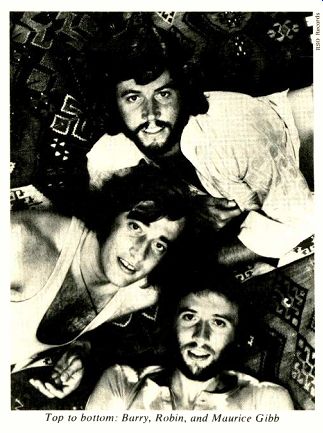STEREO REVIEW'S SELECTION OF RECORDINGS OF SPECIAL MERIT--BEST OF THE MONTH
CLASSICAL
SIR GEORG SOLTI CONDUCTS A NEW COST FAN TUTTE
London's recording of the Mozart opera joins a distinguished catalog company
COSI FAN TUTTE, Mozart's last opera based on a libretto by the able Lorenzo da Ponte, does not, to be sure, possess the boundless measures of warmth and humanity to be found in Le Nozze di Figaro, the abundance of passion and vitality that fill Don Giovanni, but it yields to no other of his works in terms of inventiveness and brilliant craftsmanship. Greatest among the opera's count less virtues is its remarkable ensemble writing, the dramatic and musical interactions of the six charac to sextet-and styles. These marvelous ensembles are perhaps the reason so many first-rank conductors are drawn to Cosi, and why they are usually inspired to their best efforts as well. Fritz Busch,
Herbert von Karajan, Karl Bohm, Eugen Jochum, and Erich Leinsdorf have all pre sided over past recordings of this opera. All of them were enjoyable, and, in their various ways, highly recommendable.
Now joining this distinguished company, with strong attractions of its own, is a new London recording of the work, with singers of the international front rank (plus the London Philharmonic) under the baton of Sir Georg Solti.
As is well known and well documented, Solti is an extremely intense conductor, and he is at his best when he can support a vivid stage action like the extended and fast moving finale of Cosi's first act.

------- SIR GEORG SOLTI, A reputation for intensity.
As is equally well known, relaxation and geniality are not his strongest suits, and though the overture, for example, moves with lightness and precision, there is something of a "driven" aura about it. Too, the exquisite farewell ensembles (particularly the trio "Soave sia it ven to") sound merely agreeable when they ought to sound ravishing, and the delicate touches of orches tration in Dorabella's aria "Smanie implacabili" are not exposed with the requisite nuance and affection.
On the other hand, Solti's tempo choices seem al ways to be unerringly correct (even better judged here than they were in his dramatic Magic Flute recording--reviewed in May 1971), his command of the ensembles is exceptionally precise, and the orchestral tone he secures is both rich and refined.
Gratifyingly, there are no real weaknesses in the casting, though the performances of the six principals do inspire some slight reservations to go with the well-earned praise. Of the two ladies of shakable fidelity, the Dorabella of Teresa Ber ganza delivers the more secure vocal performance. Her singing is firm and warm-toned, her aria "E amor un ladroncello" flows with lightness and lilt, and if the earlier "Smanie implacabili" fails to plumb quite all the expressive depths, it is as accurate musically and as endearing tonally as the rest of her singing. Miss Berganza's steady tone and Pilar Lorengar's characteristically tremulous one do not form an ideal blend in their ensemble appearances, but there is nonetheless much to admire in the latter's handling of the role of Fiordiligi. For one thing, it is more distinctly characterized than her colleague's Dorabella: she is a very feminine, unusually vulnerable woman, and her confident avowal of unswerving loyalty in "Come scoglio" is therefore all the more charmingly absurd. The lower end of that aria-and of Fiordiligi's music in general- gives her some moments of discomfort, but the top is secure, and the musical accuracy always commendable. Miss Lorengar's most exquisite singing is heard in the Larghetto duet with Ferrando, "Enettuo, net mio bicchiero" (Act II), wherein her tone is sumptuously floated.
Ryland Davies brings a good technique and a cul tivated style to Ferrando's taxing music, which, on this occasion, includes the oft-omitted (and quite difficult) aria "Ah, lo veggio." His voice is agreeable in quality, but it is somewhat wanting in tonal solidity. Tom Krause, on the other hand, contributes one of his strongest, most assured, and vocally most satisfying recorded interpretations as Guglielmo. Gabriel Bacquier, a very fine singing actor, endows the figure of the scheming Don Alfonso with the proper cynical air. Though he is vocally quite dry most of the time, the characterization does make its points.
The Despina of Jane Berbie is along traditional lines, but entirely satisfying.
As is frequently the case with Mozart operas in which Italian singers are not present, the recitatives are often delivered with haste and indifference (Miss Berbie and Mr. Bacquier are the prime of fenders), and there is also a notable inconsistency about appoggiaturas. But the opera is presented absolutely complete (as is RCA LSC-6416; the Angel and Deutsche Grammophon stereo sets have some "standard" cuts), and technically the recording offers opulent sound and impressive depth with out gimmickry. My own first preference is still Karl Bohm's performance for Angel (S-3631), but as I indicated above, I like them all, including this new one. George Jellinek
MOZART: Cosi Fan Tutte (K. 588). Pilar Lorengar (soprano), Fiordiligi; Teresa Berganza (mezzo-soprano), Dorabella; Ryland Davies (tenor), Ferrando; Tom Krause (baritone), Guglielmo; Jane Berbie (soprano), Despina; Gabriel Bacquier (baritone), Don Alfonso; Chorus of the Royal Opera House, Covent Garden; London Philharmonic Orchestra, Sir Georg Solti cond. LONDON OSA 1442 four discs $27.92.
------
THE TOKYO QUARTET: GLORIOUS AND UNERRING
Deutsche Grammophon presents their warmly communicative performances of two Haydn works T have just had the pleasure of listening to the best 1 string quartet record I've ever heard: the Toyko Quartet's new recording for Deutsche Grammophon of the first two of Haydn's splendid Op. 50 Prussian quartets (of which there are six in all).
These may not be the composer's very greatest works in this form, but it is unlikely that any of his others have been recorded in performances so surpassingly persuasive as these.
Four decades of Suzuki activity may perhaps have something-both directly and indirectly-to do with it, but it cannot be denied that there is now in Japan a remarkable climate of appreciation and a high standard of performance for string players.
The sheer expertise of the four young members of the Tokyo Quartet is therefore not surprising (they were, in fact, trained at the Toho School in Tokyo and then at Juilliard), but their feeling for the Viennese classics is something that would be exceptional in musicians of any background. From first note to last, their playing communicates the deepest understanding of every element in this mu sic- its lyricism, wit, spontaneity, occasional pa thos, and pervasive warmth of heart, as well as the peculiarly Haydnish rhythmic vitality that empha sizes both the hearty and the elegant so unselfconsciously, and tempos and phrasing so natural as to obviate any discussion of choice in these matters. I might add parenthetically that Japan has also a long standing tradition in Haydn performance: the very first recording anywhere of the choral version of The Seven Last Words (Haydn later arranged the work as the seven quartets of Op. 51) was made in Tokyo about 1930.

--- Left to right: Pilar Lorengar (Fiordiligi), Tom Krause (Guglielmo),
Teresa Berganza (Dorabella), and Ryland Davies (Ferrando)
The vivace finale of the B-flat Quartet may seem a bit too fast at first, but with playing of such assurance and precision, it turns out to be a comfortable tempo after all, and one feels that Haydn himself must be smiling. It all adds up to glorious musician ship and unerringly convincing style, and the contribution of Deutsche Grammophon's engineer, Karl-August Naegler, is a sound quality as rich, clean, and well-balanced as the playing itself.
More Haydn played by the Tokyo Quartet will surely be forthcoming from DG, but it will be with slightly different personnel. When this recording was made, the group's violinists were Koichiro Harada and Yoshiko Nakura, the violist Kazuhide Isomura, and the cellist Sadao Harada; since then the quartet has become all-male, Kikuei Ikeda re placing Nakura. They are in residence at the Corcoran Gallery in Washington, D.C., for the 1974 1975 season. Richard Freed HAYDN: String Quartet in B-flat Major, Op. 50, No. 1 (Hob. III Nr. 44); String Quartet in C Major, Op. 50, No. 2 (Hob. III Nr. 45). Tokyo String Quartet. DEUTSCHE GRAMMOPHON 2530 440 $7.98.
POPULAR THE LUSH, JAZZ-FLAVORED SOUND OF BOB JAMES Another star is added to the .firmament of the versatile CTI Repertory Company

---------- THE TOKYO QUARTET: Kazuhide Lsonu Yoshiko Nakura,
Sadao and Koichiro Harada.
THIS is getting to be embarrassing. I'll just have o point out right up front that I do not own any stock in the CTI label, nor do I owe favors to any one connected with the company. It's just that their standard of excellence is so high that I have never found grounds for any major criticism of their prod uct. So, here we go again: Bob James, who hasn't had an album of his own since 1965, when ESP released an interesting but largely unrecognized set entitled "Explosions," has now come up with a new one that is bound to win him an enthusiastic—and deserved--following. If you are fortunate enough to find the older ESP album, you will see that James was 'way ahead of the game even then, combining his technically perfect piano with electronic sound to create a whole that our ears have only recently grown accustomed to.
The new CTI album is not quite that startling, being more commercial by today's standards, but, in its own way, it is just as fine. Since making the 1965 album, Bob James has worked with Maynard Ferguson, spent four and a half years as Sarah Vaughan's musical director, scored musical shows (including Broadway's The Selling of the President), arranged for singers Dionne Warwicke, Aretha Franklin, Morgana King, and Roberta Flack, and joined the growing stable of what can perhaps best be termed the CTI Repertory Company.
It can be no mere coincidence that CTI maintains a clearly identifiable sound, so one must draw the conclusion that producer Creed Taylor's input goes beyond mere supervision of these sessions. In this case he has shown superb judgment in casting, and James gets the most out of his supporting players, from the excitement and hard-hitting brass of Moussorgsky's Night on Bald Mountain, a war horse that readily translates into modern sound, to the easy beat of Gene McDaniels' Feel Like Making Love. James was involved in the recording of Roberta Flack's hit version of that tune, and uses the exact same rhythm section here. Harmonically, the most interesting track is Valley of the Shadows, but the whole album is a fine example of lush, jazz-flavored pop, and I hope "One" is soon followed by "Two." Chris Albertson BOB JAMES: One. Bob James (keyboards); orchestra, including Thad Jones, John Faddis, and Marvin Stamm (trumpets); Grover Washington, Jr. (soprano saxophone); Dave Friedman (vibraphone): and strings. Soulero; Night on Bald Mountain; Feel Like Making Love; Valley of the Shadows; In the Garden; Nautilus. CTI 6043 $6.98, CT8 6043 $7.98, CTC 6043 $7.98.
THE BEE GEES: HARMONY, MELODY, LUXURY
Their latest album, "Mr. Natural," proves once again that the good things last WELL, yes, the album "Mr. Natural" is just a little gimmicky, but it also finds the Bee Gees luxuriously harmonic and melodic, as they've usually been, and it should be a vehicle big enough, strong enough, and fast enough to outride their critics, as they've usually done. I don't see how any one, regardless of his feelings about rock, could listen to Down the Road, say, and not like it, but there are a few small things about the album, some of them extra-musical, to put one off.
For example, Arif Mardin, who produces Bette Midler, produced this album and arranged a few too many horns and strings for it. And worse, he al lowed the insert blurb to go through quoting him as saying that this one "brings the Bee Gees' sound and identification into today's vein" and that "while there are fresher and newer techniques used, the group still retains their [sic] individuality." Awfully big of him to bring the Bee Gees up to date, don't you think? Especially in view of the fact that they've been using horns and strings at least this well for five or six years and their studio prowess, creaky old techniques and all, has consistently made their albums sound better than their stage performances. But, as I was saying and as he was saying, they do retain their individuality, however they may stand relative to "today's vein."

Top to bottom: Barry, Robin .Maurice Gibb
The main musical problems are with Charade, which sounds like supper-club glass-clinking music (and could never overcome Barry and Robin Gibb's pronouncing the word as "cherodd" anyway); the warmed-over nature of Give a Hand, Take a Hand and Heavy Breathing; and a few dumb decisions about using clichés. Most blatant of these is a hokey riff ending grafted onto Lost in Your Love, which up to that point- wasn't bad. The best music comes in Throw a Penny, Down the Road, and Voices, which appear consecutively, with Barry and Robin batting the lead vocals around like a hot handball and Maurice Gibb showing up as a rather spectacular bass player, authoritative and smart, like Paul McCartney.
And the finale-which really is one-is both grandiose and wry, if you can picture that, a song called Had a Lot of Love Last Night that is one of those simple and beautiful Bee Gees-how you say-anthems, the big Bee-Gees-as-choir, love-song-as-hymn treatment. The title song is interesting mainly for its melody, a Gibb melody that doesn't resolve in the familiar folkie turn of most Gibb melodies. I've heard the boys' vocal harmonies recorded better, but, as Arif and I said, their style endures.
Noel Coppage
BEE GEES: Mr. Natural. Barry Gibb (vocals, guitar); Robin Gibb (vocals); Maurice Gibb (vocals, bass, key boards); Geoff Westley (piano); Alan Kendall (lead guitar); other musicians. Charade; Throw a Penny; Down the Road; Voices; Give a Hand, Take a Hand; Dogs; Mr. Natural; Lost in Your Lae; I Can't Let You Go; Heavy Breathing; Had a Lot of Love Last Night. RSO SO 4800 $6.98, TP 4800 $6.97, ICS 4800 $6.97.
------------------
==============
Also see:
NEW PRODUCTS--A roundup of the latest in high-fidelity equipment